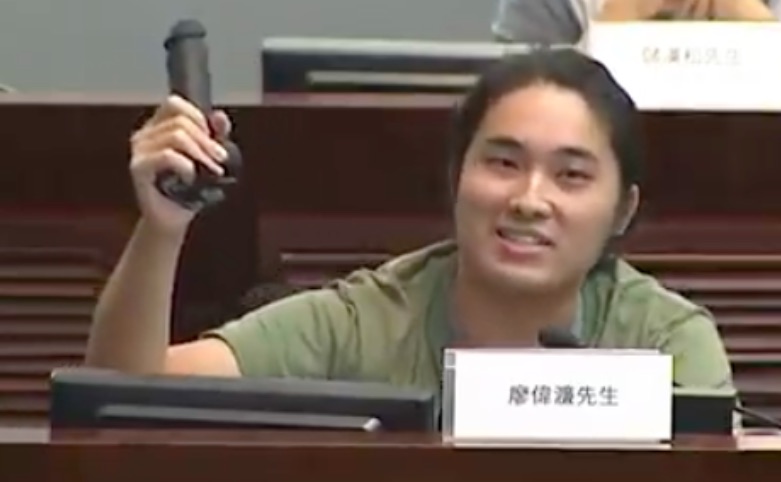Likely aware that some shameless media can’t resist writing about dildos, particularly in a political context, a member of pro-democracy party Demosistō yesterday whipped one out during a meeting on land supply at the Legislative Council.
But William Liu, a Demosistō standing committee member, wasn’t just waving the (his?) black sex toy willy nilly.
This was a dildo with a point to make, a sex toy as a symbol.
The message, though, wasn’t simple as we’re all being f****d, not quite.
He said his sturdy phallic-shaped friend “symbolizes unfair distribution” of development rights under the government’s small-house policy, which allows indigenous villagers in the New Territories to build three-story abodes if they are descended from a community that predates Britain’s leasing of the area in 1898.
The gag, you see, is a prop-backed PUN.
In Cantonese, the houses built by New Territory villagers are referred to as “ding uk”, which is phonically close to local slang for penis.
The joke, however, wasn’t appreciated by security staff at the Legislative Council.
Guards ejected Liu after he tried to deliver the dildo to Kenneth Lau Ip-keung, who was chairing the panel, organized by the Development Bureau and the Taskforce on Land Supply to receive public submissions.
Prior to being booted, Liu used his three minutes of speaking time to criticize the small-house policy as “unfair” because beneficiaries had to be male and from a specific village or clan, which he said was “ridiculous and backwards.”
He noted he was, essentially, arguing against his own self-interest because, as a descendent of an indigenous village, he was eligible under the 1979 policy to exercise his traditional land rights, which are protected by Hong Kong’s mini constitution the Basic Law.
But he said while his some of his friends had spoken enviously of what they called his “golden key”, he disagreed with the policy, saying it should be reviewed as it was open to abuse.
In several cases, indigenous villagers have been found to have sold their development rights under the policy to property developers seeking to erect luxury apartments.
A group of 11 villagers in Shatin were handed prison terms of up to three years in 2015 when it was discovered they illegally traded their right to build in their community to property developers for between HK$150,000 to HK$250,000, RTHK reported at the time.
Liu said the policy was an impediment to freeing up land for the space-starved city as, under it, large areas were set aside for indigenous villagers to realize their rights.
“Of the 1,300 hectares of idle government land, only about 30 percent of the land has been classified as “residential” or “commercial or residential.” The other 70 percent is classified as a small house development,” said Liu, who accused the government bowing to the vested interest of powerful rural committees.
“The issue of these “small housing” rights has become a profound problem in the land supply issue.”
The five-month consultation period by government-appointed Task Force on Land Supply is due to end next week, though the group’s full report is not expected until late this year or early in 2019.
Although never far from the spotlight given the city’s housing crisis, the land supply issue is heating up again as pressure builds on Chief Executive Carrie Lam to clearly state the government’s stance on solutions in her upcoming policy speech, writes the SCMP.
The Taskforce on Land Supply has advanced 18 proposed measures, including land reclamation, to deliver more space, while other advocates have suggested options including developing brownfield sites — most of which are used by businesses as storage space — turning barges into floating cities, and reclaiming golf courses.




